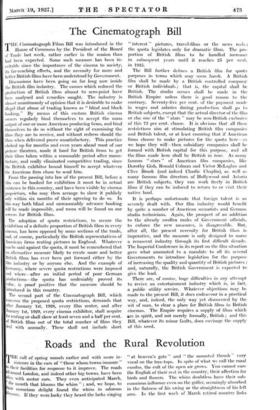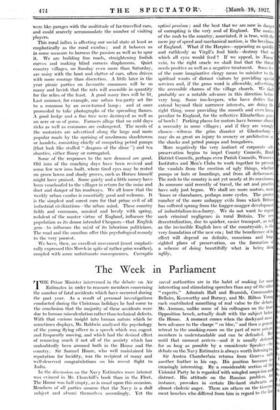Roads and the Rural Revolution
TILE call of. spring sounds earlier and with more in- sistence in the cars of `! those whom towns immure " as their facilities for response to it improve. The roads all round London, and indeed other big towns, have been alive with motor cars. They even anticipated March, the month that blooms the whins ". ; and, we hope, to their conscious delight found the whins in odorous h 1°ssoin. If they were lucky they heard the larks singing " at heaven's gate " and " the mounted thrush " very vocal on the tree-tops. In spite of what we call the rural exodus, the cult of the open air grows. You cannot cure the English of their zest in the country, their affection for birds and flowers. The whins doubtless have their sub- conscious influence even on the golfer, seemingly absorbed in the flatness of his swing or the ,straightness of his left arm. • - In the first week of March retired country links were like garages with the multitude of far-travelled cars, and could scarcely accommodate the number of visiting players.
This rural influx is affecting our social state at least as emphatically as the rural exodus ; and it behoves us in some measure to harness the passion as well as to spur it. We are building fine roads, straightening foolish curves and making blind corners diaphanous. Quiet country villages, on Sunday even more than Saturday, are noisy with the hoot and clatter of cars, often driven with more courage than discretion. A little later in the year picnic parties on favourite commons will be so many and lavish that the rats will assemble in quantity for the relics of the feast. A good many fires will be lit, Last summer, for example, one urban tea-party set fire to a common by an over-turned lamp ; and at once proceeded to take photographs of the spreading flames. A good hedge and a fine tree were destroyed as well as an acre or so of gorse. Farmers allege that on cold days ricks as well as commons are endangered. The needs of the motorists arc advertised along the large and more popular roads by the uprising of mushroom shacktowns or hamlets, consisting chiefly of competing petrol pumps (that look like stuffed " dragons of the slime ") and tea shanties, either flimsy or corrugated.
Some of the responses to the new demand are good. Old inns of the coaching days have been revived and some few new inns built, where tired eyes may be rested on green lawns and shady groves, such as Horace himself might have praised. Some gaiety and a little money have been vouchsafed to the villager in return for the noise and dust and danger of his roadways. We all know that the weekly urban exodus is essentially good and welcome. It is the simplest and surest cure for that prime evil of all industrial civilizations—the urban mind. These country fields and commons, musical and lovely with spring, redolent of the master virtue of England, influence the population as its donor intended Chequers—that English gem—to influence the mind of its laborious politicians. The road and the omnibus offer this psychological remedy to the very poorest.
We have, then, an excellent movement (most emphati- cally expressed this March in spite of rather grim weather), coupled with some unfortunate consequences. Comtptio optimi pessima ; and the best that we are now in danger of corrupting is the very soul of England. The motive of the rush to the country, associated, it is true, with the mere joy of speed and mechanical motion, is the loveliness of England: What if the Harpies—appearing as quickly and ruthlessly as Virgil's foul birds—destroy that on which all eyes would feed ? If we appeal, in Ancas' vein, to the right oracle we shall find that the threat needs positive as well as a negative treatment: Some few of the more imaginative clergy mean to minister to the Spiritual wants of distant visitors by providing special services and, if the gross word is alloWable,' advertisin., the accessible charms of the village church. We shall probably see a notable advance in this direction before very long. Some inn-keepers, who have duties that extend beyond their narrower interests,- are doing the right thing, some providing the smooth and even lawns peculiar to England, for the reflective Elizabethan game of bowls ! Parking places for motors have become almost a necessity in some villages ; and if they are wrongly chosen—witness the grim disaster at Glastonbury-. may do as great an injury to scenery or architecture as the shacks and petrol pumps and bungalows.
More negatively the very instinct of corporate self. preservation begins to impel County Councils, Rural District Councils, perhaps even Parish Councils, Women's Institutes and Men's Clubs to work together to prevent the vandals from the erection of ugly things, whether pumps or huts or hoardings, and from all defacement. The rush to the country is not yet nearly at its maximum. As someone said recently of travel, the art and practice have only just begun. We shall sec more motors, more 'buses or charabancs, perhaps more cycles. The greater number of the more unhappy evils from which Britain has suffered sprang from the hugger-mugger development of industrialism-in-a-hurry. We do not want to repeat such criminal negligence in rural Britain. The new decentralization, due to quicker, easier transport, as well as the invincible English love of the countryside, is the very foundation of the new era ; but the beneficence of its effect will depend on definite, conscious and long sighted plans of preservation, on the formation of a scheme of doing beautifully what is being clone uglily.































































 Previous page
Previous page